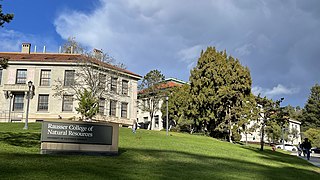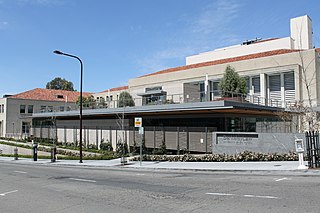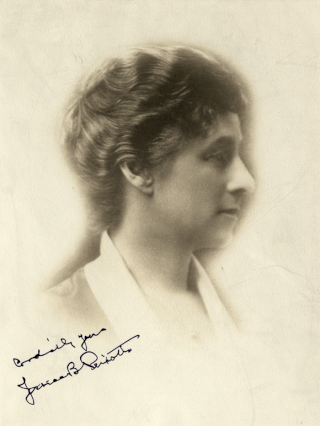
The University of California, Berkeley is a public land-grant research university in Berkeley, California, United States. Founded in 1868 and named after the Anglo-Irish philosopher George Berkeley, it is the state's first land-grant university and is the founding campus of the University of California system.
The Walter A. Haas School of Business is the business school of the University of California, Berkeley, a public research university in Berkeley, California. It was the first business school at a public university in the United States.
The Master of Social Work (MSW) is a master's degree in the field of social work. It is a professional degree with specializations compared to Bachelor of Social Work (BSW). MSW promotes macro-, mezzo- and micro-aspects of professional social work practice, whereas the BSW focuses more on direct social work practices in community, hospitals and other fields of social services. In some countries, such as Australia, the United Kingdom and Hong Kong SAR, some MSW degrees are considered equivalent to BSW qualifications as a qualifying degree.

The Columbia University School of Social Work is the graduate school of social work of Columbia University in New York City. It is one of the oldest social work programs in the US, with roots extending back to 1898. It began awarding a Master of Science degree in 1940. As of 2018, it was one of the largest social work schools in the United States, with an enrollment of over 1,000 students.
The UCLA School of Education and Information Studies is one of the academic and professional schools at the University of California, Los Angeles. Located in Los Angeles, California, the school combines two departments. Established in 1881, the school is the oldest unit at UCLA, having been founded as a normal school prior to the establishment of the university. It was incorporated into the University of California in 1919.
The New York University Silver School of Social Work provides social work education from undergraduate through doctoral levels.

The University of California, Berkeley School of Education, or the Berkeley School of Education (BSE), is one of fifteen schools and colleges at the University of California, Berkeley, a public research university in Berkeley, California. The BSE specializes in teacher training and education research.

The University of California, Berkeley School of Public Health, also called Berkeley Public Health, is one of fourteen schools and colleges at the University of California, Berkeley. The school is currently accredited by the Council on Education for Public Health.

The Rausser College of Natural Resources (RCNR), or Rausser College, is the oldest college at the University of California, Berkeley and in the University of California system. Established in 1868 as the College of Agriculture under the federal Morrill Land-Grant Acts, CNR is the first state-run agricultural experiment station. The college is home to four internationally top-ranked academic departments: Agriculture and Resource Economics; Environmental Science, Policy, and Management; Nutritional Sciences and Toxicology; and Plant and Microbial Biology, and one interdisciplinary program, Energy and Resources Group. Since February 2020, it is named after former dean and distinguished professor emeritus Gordon Rausser after his landmark $50 million naming gift to the college.

The University of Georgia School of Social Work (SSW) is a college within the University of Georgia (UGA) in Athens, Georgia, United States.

The University of Pittsburgh School of Social Work, one of the 13 schools and colleges within the University of Pittsburgh, is located in the Oakland section of Pittsburgh, Pennsylvania. Its offices are in the world-famous Cathedral of Learning, a forty-story, Gothic style edifice that is the signature building of the university.

The University of California, Berkeley School of Law is the law school of the University of California, Berkeley. The school was commonly referred to as "Boalt Hall" for many years, although it was never the official name. This came from its initial building, the Boalt Memorial Hall of Law, named for John Henry Boalt. This name was transferred to an entirely new law school building in 1951 but was removed in 2020.

Graciela Chichilnisky is an Argentine-American economist known for her work in economics and climate change. A professor of economics and statistics at Columbia University and visiting professor to Stanford University, her economic research is marked by the application of mathematics and topology, as well as research in international and development economics. She is also co-founder of the direct-air capture company Global Thermostat, and served as its CEO from its founding in 2010 until she stepped down in 2022.

Jessica Blanche Peixotto was an American educator and writer.
Patricia Zavella is an anthropologist and professor at the University of California, Santa Cruz in the Latin American and Latino Studies department. She has spent a career advancing Latina and Chicana feminism through her scholarship, teaching, and activism. She was president of the Association of Latina and Latino Anthropologists and has served on the executive board of the American Anthropological Association. In 2016, Zavella received the American Anthropological Association's award from the Committee on Gender Equity in Anthropology to recognize her career studying gender discrimination. The awards committee said Zavella's career accomplishments advancing the status of women, and especially Latina and Chicana women have been exceptional. She has made critical contributions to understanding how gender, race, nation, and class intersect in specific contexts through her scholarship, teaching, advocacy, and mentorship. Zavella's research focuses on migration, gender and health in Latina/o communities, Latino families in transition, feminist studies, and ethnographic research methods. She has worked on many collaborative projects, including an ongoing partnership with Xóchitl Castañeda where she wrote four articles some were in English and others in Spanish. The Society for the Anthropology of North America awarded Zavella the Distinguished Career Achievement in the Critical Study of North America Award in the year 2010. She has published many books including, most recently, I'm Neither Here Nor There, Mexicans' Quotidian Struggles with Migration and Poverty, which focuses on working class Mexican Americans struggle for agency and identity in Santa Cruz County.
Craig Winston LeCroy is a Communitas Professor of Social Work, School of Social Work at Arizona State University.

Martha Alexander Chickering (1886–1988) was a social work educator, Director of the California State Department of Social Welfare (1939–1945) and member of the California Social Work Hall of Distinction. She was included for her work in establishing professional social work education in the state of California.
Richard Michael Scheffler is an American health economist whose career has focused on applying health economics to public policy both nationally and globally. He is a Distinguished Professor of Health Economics and Public Policy at the University of California, Berkeley in the Graduate School of Public Health and the Goldman School of Public Policy. He is the Founding Director of the campus-affiliated, research-driven Nicholas C. Petris Center on Health Care Markets and Consumer Welfare.











